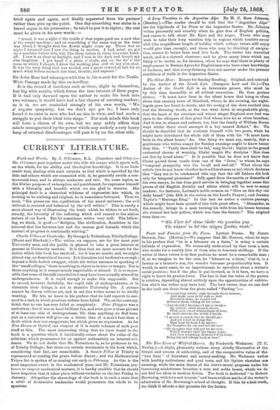The Silent flour. Essays for Sunday Reading. Original, and selected
by the Author of the Gentle Life. (Sampson Low and Co.)—The Author of the Gentle Life is an inveterate proser, who must be by this time insensible to all critical correction. He thus praises silence. "It must have been in the silent hours that hung so often about that country town of Stratford, where, in the evening, the night- ingale gave her heart to music, and the cooing of the dove soothed into rest the listening woods, as the sun went down in unspeakable glory, that the heart of the sweetest and wisest singer England ever had was open to the whispers of that great God whose love he so often breathes.. And it was in silence and sadness, too, that the family of William Barns wept whilst there stood amongst it a boy named Robert," &c. We should be thankful that he contents himself with two poets, when he might have introduced the whole roll of them with his "It must have been in the silent hours," &c. One thing we must say, namely, that a gentleman who writes essays for Sunday evenings ought to know better- than this. " Verily thou shalt be fed,' sang David ; higher in the grand orchestral chorus of worship, Christ taught His disciples Man does. not live by bread alone.' " Is it possible that he does not know that Christ quoted these words from one of the "Jews," to whom he says "temporal prosperity was the be-all and end-all." What about the article (we do not know whether he is a Churchman or no) which declares that "they are to be condemned who say that the old fathers did look only for temporal promises?" Still, apart from the merits or demerits of his own essays, he has done good service in bringing together some fine pieces of old English divinity and ethics which will be new to many readers ; for instance, Latimer's noble sermon on " Give us this day our daily bread" (the fifth in the series on the Lord's Prayer), and Jeremy Taylor's "Marriage Ring." In this last we notice a curious passage, which might have been quoted of late with great effect. " Menander, in the comedy, brings in a man turning his wife from his house because- she stained her hair yellow, which was then the beauty." The original. runs thus :— " Nve npsr axo, TUE' vie rod/km yap cro;copo; 'ou 8E7 rigs rpixas EaPeas ,reran."






























 Previous page
Previous page